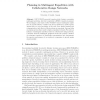Free Online Productivity Tools
i2Speak
i2Symbol
i2OCR
iTex2Img
iWeb2Print
iWeb2Shot
i2Type
iPdf2Split
iPdf2Merge
i2Bopomofo
i2Arabic
i2Style
i2Image
i2PDF
iLatex2Rtf
Sci2ools
126
click to vote
AI
2007
Springer
2007
Springer
Planning in Multiagent Expedition with Collaborative Design Networks
DEC-POMDPs provide formal models of many cooperative multiagent problems, but their complexity is NEXP-complete in general. We investigate a sub-class of DEC-POMDPs termed multiagent expedition. A typical instance consists of an area populated by mobile agents. Agents have no prior knowledge of the area, have limited sensing and communication, and effects of their actions are uncertain. Success relies on planing actions that result in high accumulated rewards. We solve an instance of multiagent expedition based on collaborative design network, a decision theoretic multiagent graphical model. We present a number of techniques employed in knowledge representation and demonstrate the superior performance of our system in comparison to greedy agents experimentally.
AI 2007 | Artificial Intelligence | Cooperative Multiagent Problems | Multiagent | Multiagent Expedition |
Related Content
| Added | 07 Jun 2010 |
| Updated | 07 Jun 2010 |
| Type | Conference |
| Year | 2007 |
| Where | AI |
| Authors | Yang Xiang, Franklin Hanshar |
Comments (0)

